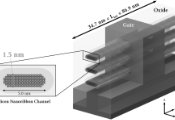The Open Quantum Institute Pilot Phase at CERN
March 06, 2024 -- The Open Quantum Institute (OQI) passes a new milestone today, with the operational launch at CERN. Following a successful one-year incubation period led by the Geneva Science and Diplomacy Anticipator (GESDA), the new, three-year CERN-based pilot will build on the efforts to date to help unleash the full power of quantum computing for the benefit of all.
Proposed, designed, and incubated through GESDA, in collaboration with some 180 experts from all over the world, the OQI is a multilateral science diplomacy initiative, uniting academia, technology companies, the private sector, the diplomatic community, philanthropy organisations and global citizens in a joint effort towards more open and inclusive quantum computing. By facilitating equal access to cutting-edge nascent technologies, the OQI seeks to accelerate the potential of quantum computing for all society and to support the development of concrete quantum solutions aimed at achieving the United Nations’ Sustainable Development Goals (SDGs).
During its pilot phase, hosted at CERN and supported by the Union de Banques Suisses (UBS), the OQI will be part of CERN’s wider Quantum Technology Initiative (QTI), launched in 2020 and managed by the IT department. Building on QTI’s mission to explore the full potential of quantum technologies and to maximise their societal impact, the OQI will work to push the boundaries of geography and disciplines to ensure that quantum computing is harnessed to tackle some of the key global challenges.
“CERN offers ideal conditions for the development of the OQI, and my hope is that this initiative will not only be a success, but also a model of what scientific diplomacy can do to promote concrete projects of benefit to humanity”, says Fabiola Gianotti, CERN Director-General. “During the pilot phase, the OQI will benefit from CERN’s experience in deploying scientific and technological progress to the benefit of society. We look forward to working with GESDA and other partners from academia, industry and government to ensure that quantum computing is accessible to all, including underserved regions of the world.”




































